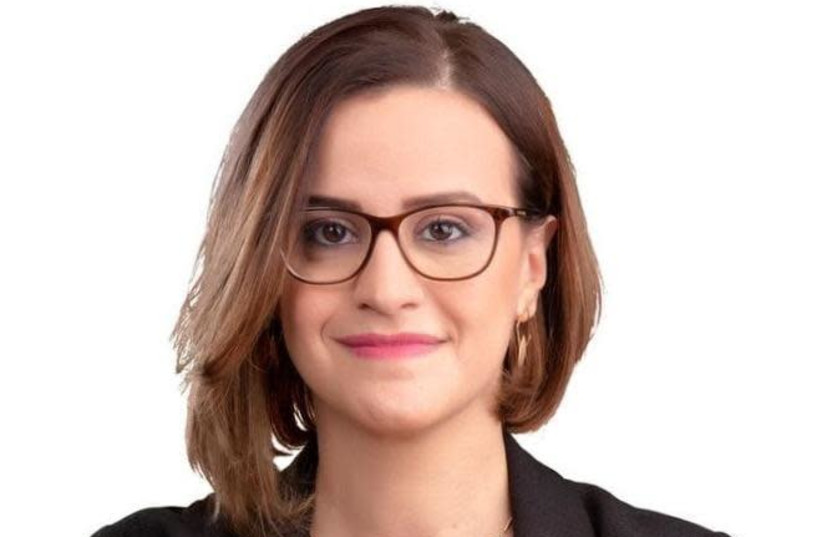High Court President Esther Hayut confronted Likud lawyer Avi Halevi about Avichai Mandelblit’s line of argument
MK Heba Yazbak of UAL-Balad – (photo credit: Courtesy)
A special expanded nine justice panel of the High Court of Justice on Sunday green-lighted Heba Yazbak, by a narrow 5-4 vote, to run for the Knesset with the Israeli-Arab Joint List despite her statements against Israel and the IDF.
She had petitioned to the High Court to intervene after the Central Election Committee disqualified her.
While normally only three justices hear a case, nine justices are reserved for issues of major constitutional importance.
Last week, Likud lawyer Avi Halevi told the High Court that Yazbak had more than crossed the line with her public statements and posts supporting terrorists Samir Kuntar and Dalal Mughrabi and refusing to repudiate physical resistance against the IDF.
In the same hearing, Otzma Yehudit leader and lawyer Itamar Ben-Gvir told the High Court that they could not “have one law for [Michael] Ben-Ari, [Baruch] Marzel and [Bentzi] Gopstein and a different law for Yazbak. Arbitrary enforcement endangers the rule of law.”
Ben-Ari, Marzel and Gopstein are all Otzma Yehudit candidates who the High Court has disqualified in the past for racism against Arabs, while controversially declining to disqualify Joint List Israeli-Arab candidates who made controversial statements.
Ben-Gvir left out that the High Court did allow him to run, distinguishing between statements that have multiple interpretations and statements that can only be viewed as violating the law’s prohibition on racism on one hand or support for armed conflict against the State of Israel on the other.
Justice Uzi Vogelman hinted to him that he had intentionally omitted this point.
In addition, a number of Israeli-Arabs have been indicted and convicted for statements or actions against Israel, but these politicians do not get to the point of running.
By implication, this argument seemed to be Attorney-General Avichai Mandelblit’s argument for allowing Yazbak to run.
While his office condemned her statements as highly problematic, a state attorney told the High Court that her statements could be interpreted in different ways.
As long as one of the ways that her statements could be interpreted was directed at a more general support for the idea of Israel as “a state of its citizens” instead of having certain Jewish values trump certain secular democratic values, the state lawyer said she could not be disqualified.
Further, the state has argued that, while problematic, Yazbak’s statements did not meet the “critical mass” test for statements which require blocking someone from running for office.
High Court President Esther Hayut confronted Halevi about Mandelblit’s line of argument.
Hayut implied that unless Halevi could prove fully that there was no doubt that Yazbak’s statements were support for armed conflict against the State of Israel, that any ambiguity needed to be viewed in her favor.
Halevi tried to argue that around 20 of her statements met the “critical mass” test for disqualification and that there was no real doubt about what Yazbak meant by her statements.
Ben-Gvir attacked Yazbak for recently deleting some of her more problematic social media posts, calling her actions confirmation of guilt and obstruction of evidence.
Hayut dismissed this claim, saying that (unlike for example incriminating private cellphone texts) her posts had been public for a long time, that everyone knew what she had posted and that she knew that she could not completely cover them up.
This meant that, whatever Yazbak’s intentions by deleting the posts, the deletion could not be held against her.
Justice Noam Sohlberg pressed Yazbak’s lawyer repeatedly that none of his contextual explanations really justified her 2013 post saluting female terrorist Mughrabi for accomplishing so much (directing a cell that killed 35 Israelis) before dying at the young age of 20.
Yazbak’s lawyer said that when the Knesset candidate wrote this phrase she was dabbling in the Israeli-Arab rhetorical arena and narrative in which all sorts of metaphors are tossed out which one might not support.
As an example, the lawyer cited that PA President Mahmoud Abbas has named certain locations after Hamas terrorists even though he is more at odds with Hamas than anyone.
The lawyer also said that 18 of the 20 problematic examples were mere opposition to administrative detention or support for Palestinian hunger strikers – issues totally within the Israeli-Arab mainstream and which do not relate to supporting violence.
Sohlberg implied that the support for Mughrabi was too damaging to be explained.
He also pressed the state lawyer to explain why Mandelblit had disqualified some of the evidence filed against Yazbak, claiming that if all of it had been included, maybe the “critical mass” test would have been met.
Following the hearing, Ben-Gvir, Yazbek and their supporters yelled at each other outside of the courtroom with right-wing activists calling Yazbak a “terrorist” and Yazbak calling Ben-Gvir “racist.”





Leave a Reply
You must be logged in to post a comment.